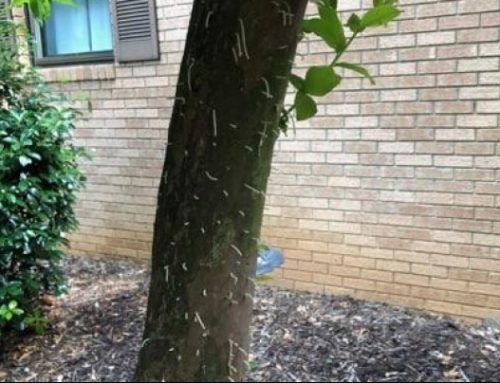Last week we talked about heat stress. As you might notice there have been a lot of factors of the past few years putting our environment under great deals of stress such as longer dry periods with higher temperatures, longer periods of rain and very cold temperatures, mixed with more intense storms. This mixture is a good recipe for a weakened “immune-system,” especially for trees. This is something to really take into account when considering the health of your trees. When the trees go under this amount of irregular stress it makes them an easy target for things such as pests and diseases. A clear example of this is the Crape Myrtle Bark Scale.
Around the lake region in July of 2016, a Heartwood arborist found a new tree pest that previously had not been found in the Carolinas. Heartwood Tree found this pest on one of our most frequently planted landscape trees, the Crape Myrtle. After researching the extensive amount of technical material that many institutions have produced, we narrowed it down to a scale insect that was mostly found in regions such as Texas. A sample was collected and sent to the entomology department at NC State. In August, he had received a confirmation from Dr. Steve Frank that it was indeed Crape Myrtle Bark Scale.
Scale is a type of sucking insect that feeds on various plant materials. There are a number of different scale insects and the insect tends to be host specific. Scale can be divided into 2 categories; armored (hard) and soft. During the feeding process Armored scales do not produce honeydew but Soft scales do. Honeydew is a sweet, sticky liquid excreted by sucking insects. Crape Myrtle Bark Scale is a Soft scale.
Crape Myrtle Bark Scale produces a white, fluffy wax covering and reside on the trunks and stems of Crape Myrtles. This pest can be seen with the naked eye but usually is found after seeing Black Sooty Mold on anything beneath the feeding insect. Black Sooty Mold is a fungus that uses the honeydew as a food source. Other sucking insects, such as Aphids, will also produce honeydew then followed by Black Sooty Mold. Black Sooty Mold will reduce the vigor and beauty of ornamental plants…not to mention cover the deck, driveway and your cars! The good news is that we can help you with this pest. We have found that it is relatively easy to control the Crape Myrtle Bark Scale. Once the scale is under control, the Black Sooty Mold will also go away with time and weather and then you can pressure wash the deck and driveway.




